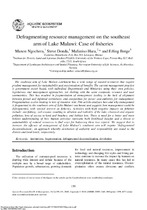Defragmenting resource management on the southeast arm of Lake Malawi: Case of fisheries

View/
Date
2018Author
Ngochera, Maxon
Donda, Steve
Hara, Mafaniso
Metadata
Show full item recordAbstract
The southeast arm of Lake Malawi catchment has a wide range of natural resources that require
prudent management for sustainability and maximisation of benefits. The current management practice
is government sector based, with individual Departments and Ministries using their own policies,
legislations and management approaches, yet dealing with the same composite resource and user
communities. This has resulted in fragmentation of management leading to the lack of alignment
between formal and informal institutions, and competition for power and authority for management.
Fragmentation is also leading to loss of resource rent. This article analyses how and why management
is fragmented in the southeast arm of Lake Malawi catchment and suggests how management could be
defragmented, with special interest on fisheries. Activities with high negative impacts on fisheries
include: overfishing; soil erosion resulting in siltation and turbidity of the lake; chemical and organic
pollution; loss of access to land and beaches; and habitat loss. There is need for a better and more
holistic understanding of how human activities represent both livelihood benefits and a threat to
sustainability of natural resources to find ways for balancing these two aspects. We suggest that to
increase the efficacy of management of Lake Malawi’s southeast arm will require ‘defragmented
decentralization’, an approach whereby devolution of authority and responsibility are ceded to the
district and local levels, respectively.
